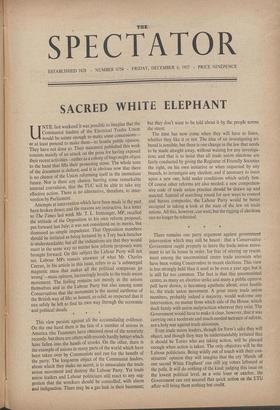SACRED WHITE ELEPHANT
UNTIL last weekend it was possible to imagine that the Communist leaders of the Electrical Trades Union would be astute enough to make some concessions— or at least pretend to make them—to hostile public opinion. They have not done so. Their statement published this week consists mainly of an attack on the press for having exposed their recent activities—rather as a colony of bugs might object to the hand that lifts their protecting stone. The whole tone of the document is defiant; and it is obvious now that there is no chance of the Union reforming itself in the immediate future. Nor is there any chance, barring some remarkable internal convulsion, that the TUC will be able to take any effective action. There is no alternative, therefore, to inter- vention by Parliament. Attempts at intervention which have been made in the past have broken down; and the reasons are instructive. In a letter to The Times last week Mr. T. L. Iremonger, MP, recalled the attitude of the Opposition to his own reform proposal, put forward last July; it was not considered on its merits, but dismissed as• simple impudence. That Opposition members should be irritated at being lectured by a Tory back-bencher is understandable; but all the indications are that they would' react in the same way no matter how reform proposals were brought forward. On this subject the Labour Party will not see. Labour MPs remain unaware of what Mr. Charles Curran, in his article in this issue, refers to as 'a submerged magnetic mass that makes all the political compasses go wrong'—mass opinion, increasingly hostile to the trade union movement. The feeling remains not merely in the unions themselves and in the Labour Party but also among some Conservatives that the movement is the sacred carthorse of the British way of life; so honeq, so solid, so respected that it can safely be left to find its own way through the economic and political shoals. * * * This view persists against all the accumulating evidence. On the one hand there is the fate of a number of unions in America (the Teamsters have obtained most of the notoriety recently, but there are others with records hardly better) which have fallen into the hands 'of crooks. On the other, there is the example of unions in many parts of the world which have been taken over by Communists and run for the benefit of the party. The long-term object of the Communist leaders, about which they make no secret, is to emasculate the trade union movement and destroy the Labour Party. Yet trade union leaders and Labour politicians still react to any sug- gestion that the wreckers should be controlled, with alarm and indignation. There may be a gas leak in their basement; but they don't want to be, told about it by the people across the street.
The time has now come when they will have to listen, whether they like it or not. The idea of an investigating tri- bunal is sensible; but there is one change in the law that needs to be made straight away, without waiting for any investiga- tion; and that is to insist that all trade union elections are fairly conducted by giving the Registrar of Friendly Societies the right, on his own initiative or when requested by any branch, to investigate any election, and if necessary to insist upon a new one, held under conditions which satisfy him. Of course other reforms are also needed; a new comprehen- sive code of trade union practice should be drawn up and enacted. Instead of searching round for new ways to control and harass companies, the Labour Party would be better occupied in taking a look at the state of the law on trade unions. All this, however, can wait; but the rigging of elections can no longer be tolerated.
There remains one party argument against government intervention which may still be heard : that a Conservative Government ought properly to leave the trade union move- ment to set its house in order, for fear of stirring up resent- ment among the uncommitted centre trade unionists who have been voting Conservative in recent elections. This view is less strongly .held than it used to be even a year ago; but it is still far too common. The fact is that this uncommitted centre, as many an abortive strike and many a public opinion poll have shown, is becoming apathetic about, even hostile to, the trade union movement. A great many trade union members, probably indeed a majority, would welcome any intervention, no matter from which side of the House, which dealt firmly with union malpractices wherever they exist. The Government would have to make it clear, however, that it was carrying out a moderate and much-needed measure of reform, not a. holy war against trade unionism.
Even trade union leaders, though for form's sake they will object, and though they may be understandably irritated that it should be Tories who are taking action, will be pleased enough when action is taken. The only objectors will be the Labour politicians. Being wildly out of touch with their con- stituents' opinion they will imagine that the cry 'Hands off our sacred White Elephant' can still jog voters leftward at the polls. It will do nothing of the kind; judging this issue on the lowest political level, as a vote loser or catcher, the Government can rest assured that quick action on the ETU affair will bring them nothing but credit.














































 Previous page
Previous page